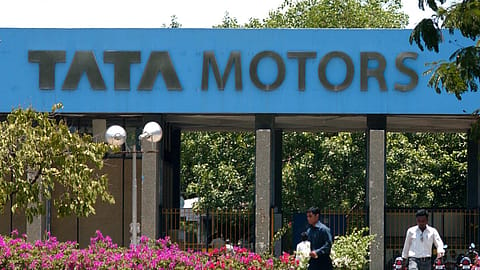Tata Motors overtakes Maruti Suzuki's m-cap
Tata Motors pips Maruti Suzuki India Ltd to become India's most valued carmaker.

Tata Motors has overtaken India's largest carmaker Maruti Suzuki's market capitalisation to become the country's most valued automaker.
Shares of Tata Motors, the owner of British luxury brand Jaguar and Land Rover (JLR), gained 5% in intraday trade on Tuesday to hit a 52-week high of ₹886.30 on the BSE. The stock closed 2.19% higher at ₹859.25.
The Nexon.ev and Punch.ev maker's market cap stood at ₹3.15 lakh crore, surpassing the ₹3.13 lakh-crore m-cap of Maruti Suzuki. Tata Motors' mcap includes the value of its differential voting rights (DVR) shares at ₹29,119 crore.
In July last year, the Tata Group company said it would convert its DVR shares into ordinary shares to simplify its capital structure. Tata Motors first issued DVR shares in October 2008 to repay the loans taken to fund the $2.3-billion acquisition of JLR from Ford.
Shares of Tata Motors have almost doubled over the past year, driven by robust sales at JLR, which accounts for two-thirds of the parent's revenues. JLR delivered the highest wholesales in 11 quarters during the quarter ended December 31, 2023.
The luxury carmaker halved its break-even volume threshold from 600,000 units in FY19 to 300,000 units in FY23 by betting on top-end SUVs. JLR's most profitable models such as Range Rover, Range Rover Sport and Defender contribute 76% to its order book. Its order book, however, fell from 168,000 units at the end of the second quarter to 148,000 units as of December 2023 on the back of faster deliveries to customers.
Tata Motors net automotive debt stood at ₹38,700 crore at the end of the second quarter. Of this, the domestic business accounted for ₹7,600 crore debt. JLR plans to slash its net debt to less than 1 billion pounds by the end of FY24 and become net cash positive by FY25.
Recommended Stories
In the domestic electric vehicle market, Tata Motors holds the pole position with nearly 75% market share. EVs constitute 13-15% of its overall passenger vehicle sales in India. The carmaker is eyeing 50% of its wholesales to be electric by 2030.
Globally, JLR is spending 15 billion pounds over the next five years to transition to EVs and to catch up with its peers.
Tata Motors' upcoming premium e-SUV range 'Avinya' will be based on JLR's EMA (Electrified Modular Architecture) platform, accelerating the parent's entry into the high-end Gen 3 EV segment, besides cutting development-related costs.
Tata's domestic passenger vehicle business has already turned a corner. Its market share has swelled to 13.4% in the first half of FY24 from 5% three years ago. To meet the growing demand, the company has already commenced operations at the Sanand plant in Gujarat that it bought from Ford. The new plant will add another 30,000 units to Tata Motors' current capacity of 55,000 units per month.
(INR CR)